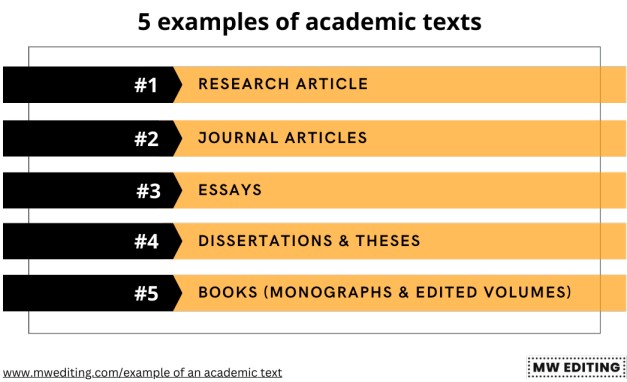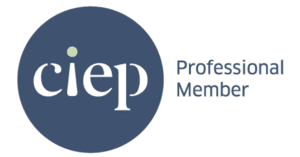An example of an academic text is a formal and structured piece of writing used in scholarly contexts, such as research papers, journal articles, essays, dissertations and theses and academic books (edited volumes and monographs). Its purpose is to present information, arguments and evidence based on research or critical thinking.
- Key characteristics of academic texts
- Types of academic texts
- Where to find them academic texts
- How editing services can help academic texts
Characteristics of every example of an academic text
Key characteristics of every example of an academic text include:
- Objective tone: Academic writing is impersonal, and it avoids bias by focusing on facts and evidence.
- Formal language: It uses advanced vocabulary and avoids colloquialisms or informal expressions.
- Clear structure: Typically organised with an introduction, body and conclusion, often following a specific style guide (e.g. APA, MLA).
- References and citations: Examples of academic texts include citations of sources to support claims and acknowledge others’ work.
- Critical analysis: Academic texts often go beyond describing facts to analyse, interpret and argue a position or hypothesis.
Examples of academic texts
Academic texts come in various forms, each serving specific purposes in scholarly contexts. Here is a discussion of the main types:

Research papers
- Purpose: Research papers present original findings or experimentation on a specific topic. These are often published in academic journals and contribute to knowledge within a specific field.
- Structure: Typically includes sections such as an abstract, introduction, literature review, methodology, results, discussion, conclusion and bibliography.
- Example: A research paper on climate change might present data from a field study on glacial melting, analyse it and discuss the implications.
Journal articles
- Purpose: Journal articles are peer-reviewed scholarly writings on various topics. They can be original research, literature reviews or theoretical explorations.
- Structure: Similar to research papers, though they may be shorter and focused on narrower topics. The rigour and depth depend on the type of article (e.g. review, theoretical, empirical).
- Example: An article in a medical journal might summarise recent developments in a particular treatment method, critically analysing its effectiveness.
Essays
- Purpose: Academic essays are typically written by students as part of coursework. They are used to develop and assess critical thinking, argumentation and research skills.
- Structure: Essays are more flexible than research papers but generally include an introduction, a thesis statement, supporting arguments or evidence and a conclusion.
- Example: A literature essay might analyse themes in a novel or explore the historical context of a literary movement.
Dissertations and theses
- Purpose: These are long, comprehensive documents submitted in partial fulfilment of a degree. They present the author’s original research, contributing to academic knowledge.
- Structure: Dissertations and theses are structured similarly to research papers but are far more extensive. They usually consist of an introduction, literature review, methodology, results, discussion, conclusion and bibliography.
- Example: a PhD dissertation on the economic impact of climate change submitted to a university.
Academic books
Edited volumes
- Purpose: Edited volumes are collections of chapters, each written by different authors but centred on a single overarching theme. The editor curates and organises contributions from various scholars.
- Structure: Each chapter is typically written as a standalone academic essay or study, contributing to the book’s overall subject.
- Example: An edited volume on digital humanities might feature chapters on different tools and methods used in the field.
Monographs
- Purpose: A monograph is a comprehensive, in-depth study of a single subject by a single author. It contributes original research and is often used by specialists in a field.
- Structure: It follows a book format, typically with chapters organised around a detailed exploration of the topic backed by extensive references and analysis.
- Example: A monograph might explore the history and socio-political implications of a specific war or movement.
Where to find examples of academic texts?
You can find examples of these academic texts in several locations, both online and in physical libraries. Here is where you can look for each type:
Research papers
Online databases
- Google Scholar is a freely accessible search engine for scholarly articles and research papers.
- JSTOR provides access to thousands of academic journals, books and primary sources (subscription required for full access).
- PubMed is a leading database for biomedical literature and research papers.
Academic journals
- Elsevier is a platform that publishes a wide range of scientific, technical and medical journal articles.
- SAGE Journals offers articles on social sciences, humanities and health.
- Taylor & Francis Online provides access to scholarly articles in various disciplines.
Essays
- Course materials: Some universities or academic websites provide essay examples as part of writing resources. For example, Purdue OWL provides guidance on academic writing and includes examples.
- University repositories: Many universities have online repositories (e.g. Oxford University Research Archive, Harvard DASH, Cambridge University Apollo) where student essays, dissertations and theses are stored.
Dissertations and theses
- University repositories: Most universities have digital repositories (e.g. Oxford University Research Archive, Harvard DASH, Cambridge University Apollo) where they archive the theses and dissertations of their students. These are usually accessible online and provide full-text versions of the documents.
- ProQuest Dissertations & Theses Global is one of the largest databases for theses and dissertations from around the world. It includes millions of full-text dissertations and abstracts from a wide range of academic fields.
- Open access repositories: For instance, OATD (Open Access Theses and Dissertations) provides access to open-access theses and dissertations from universities around the world. It’s a free resource that aggregates content from institutional repositories.
- Google Scholar helps search for specific topics and often links to university repositories or databases where the full text can be accessed.
Academic books (Edited volumes and monographs)
- Academic publishers: For instance, Cambridge University Press is an academic press that publishes scholarly books across various disciplines. Routledge is a for-profit academic publisher of academic books, especially in the humanities and social sciences.
- Google Books provides previews or full-text access to a wide variety of academic books.
- Library catalogues: You can access monographs and edited volumes through your university library’s online catalogue or large public libraries. For instance, WorldCat is a global library catalogue where you can search for academic books.
- Open access repositories: For instance, DOAJ (Directory of Open Access Journals) provides free access to thousands of academic journals, making it easier to access journal articles without subscription fees. Moreover, OATD (Open Access Theses and Dissertations) is a resource for finding open access graduate-level academic essays and theses.
How can an example of an academic text benefit from professional editing services?
Each type of academic text can benefit from professional editing services, ensuring clarity, accuracy and coherence, which are essential for academic credibility. Here is how various editing services improve the quality of academic texts:
Research papers
By using the following services, researchers can ensure their work is free of distractions like errors or poor structure, thus increasing its chances of acceptance in prestigious journals.
- Proofreading helps eliminate typographical, grammatical and punctuation errors that can detract from the paper’s professionalism and make it harder to read.
- Copyediting ensures the language is clear, consistent and free of stylistic inconsistencies. This service focuses on sentence structure, tone and adherence to citation styles (e.g. APA, MLA).
- Line editing refines the flow of writing and strengthens the academic argument by improving readability and enhancing the logic between sentences and paragraphs.
- Developmental editing is especially helpful for refining the structure of the research paper, making sure that arguments are coherent and that the research question, methodology and conclusions are logically connected.
Journal articles
Professional editing enhances clarity and organisation, increasing the likelihood of a successful peer review and acceptance for publication.
- Proofreading helps remove minor errors in spelling, grammar and punctuation, which is essential for maintaining a professional standard.
- Copyediting ensures adherence to the specific style guide of the journal (e.g. proper use of abbreviations, consistent terminology and precise language).
- Line editing improves the overall clarity and precision of arguments, which is crucial in short journal articles where every word counts.
- Developmental editing in cases of review or theoretical articles, developmental editing can help refine the argument’s structure, ensuring the article contributes a new perspective or advances current knowledge effectively.
Essays
Professional editing can significantly improve the quality of a student’s submission, enhancing their academic performance by ensuring their argument is presented clearly and logically.
- Proofreading corrects minor errors that can affect the clarity and professionalism of their essays.
- Copyediting ensures academic tone, proper structure and adherence to referencing styles required by the instructor or institution.
Dissertations and theses
Professional editing services, such as proofreading and copyediting, can help students prepare theses and dissertations for publication in an ethical way by refining the clarity, style and structure of the text while maintaining academic integrity.
- Proofreading corrects minor errors such as spelling, grammar, punctuation and formatting inconsistencies. It ensures the thesis or dissertation is polished without changing its content or structure.
- Copyediting improves the clarity, flow and readability of the text, addressing issues with sentence structure, word choice and tone. It ensures the writing is clear and professional while maintaining the author’s original voice and arguments.
Academic books
Professional editing ensures that the edited volume or monograph is polished, well-organised and free from inconsistencies, significantly improving its chances of publication and enhancing its impact on the academic community.
Edited volumes
- Proofreading is vital for catching minor errors across multiple chapters written by different authors.
- Copyediting ensures consistency in style, terminology and structure across different contributions, maintaining uniformity in the entire volume.
- Line editing improves the readability of each chapter, ensuring that arguments are well-developed and clear.
- Developmental editing may help in organising the chapters logically, ensuring that each contributes meaningfully to the overall theme. For edited volumes, managing the cohesion between different authors’ contributions is key.
- Indexing is essential for creating an effective index that allows readers to easily navigate the book’s key themes, concepts and references.
Monographs
- Proofreading ensures no minor errors detract from the author’s authority on the subject.
- Copyediting ensures consistent style, terminology and language usage throughout the text, which is crucial for maintaining a professional tone and clear communication.
- Line editing helps refine arguments, transitions and overall narrative flow, which is important for long, detailed academic studies.
- Developmental editing can help authors structure complex arguments, ensuring that the book’s chapters follow a logical and coherent progression.
- Indexing creates a detailed index, which is essential in academic books, allowing researchers and readers to easily locate key terms and ideas.
General benefits of using professional editing
- Increased readability: Professional editing enhances the clarity and readability of the text, making it easier for reviewers, professors or the general academic community to engage with the content.
- Adherence to standards: Professional editors ensure compliance with required academic style guides, making submissions more likely to pass editorial or institutional scrutiny.
- Improved credibility: Well-edited academic texts are seen as more professional and credible, which can improve a researcher’s reputation or a student’s academic standing.
- Higher chances of publication or better grades: For research papers, journal articles or dissertations, polished, well-structured submissions are more likely to be accepted for publication or awarded higher grades.
Key takeaways
In conclusion, academic texts are essential for advancing knowledge, requiring clarity, structure and critical analysis. Professional editing enhances these elements, ensuring academic credibility and improving chances of publication or higher grades. Using services like proofreading, copyediting and developmental editing helps refine arguments, correct errors and ensure adherence to academic standards. As a result, well-edited academic texts are more effective, professional and impactful in scholarly contexts.
If you are an academic author looking for editing or indexing services, contact me. I am an experienced editor, and I offer a free sample edit and an early bird discount.

